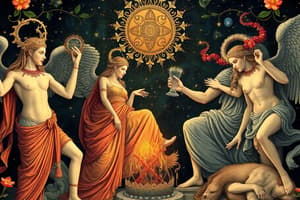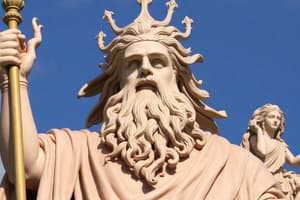Podcast
Questions and Answers
All of the following statements concerning Greek religion in the eighth century are true except:
All of the following statements concerning Greek religion in the eighth century are true except:
- Cthonian gods are gods of Olympus that were unmarried (correct)
- Zeus held a central role among the gods
- Ritual practices were an important part of Greek religion
- Greek religion included various deities
All of the following statements concerning Greek gods are true except:
All of the following statements concerning Greek gods are true except:
- Poseidon is the god of the sea
- Athena was born from Zeus's head
- Zeus is known as the king of the gods
- Aphrodite went to Hades and brought Adonis back from the dead (correct)
In the war in heaven, Zeus defeated his father Cronus.
In the war in heaven, Zeus defeated his father Cronus.
True (A)
Semele died because she saw Zeus in his glory.
Semele died because she saw Zeus in his glory.
All of the following statements concerning the story of Athena are true except:
All of the following statements concerning the story of Athena are true except:
All of the following statements concerning the story of Demeter are true except:
All of the following statements concerning the story of Demeter are true except:
Some think that the 'supreme revelation' of the Eleusinian Mysteries was the showing of a single ear of corn.
Some think that the 'supreme revelation' of the Eleusinian Mysteries was the showing of a single ear of corn.
Zeus sent Apollo to Hades to retrieve Persephone.
Zeus sent Apollo to Hades to retrieve Persephone.
The immortality of the Greek gods of ancient Greece encouraged the growth of philosophy.
The immortality of the Greek gods of ancient Greece encouraged the growth of philosophy.
All of the following statements concerning gods, humans, and sacrifices are true except:
All of the following statements concerning gods, humans, and sacrifices are true except:
Offerings were often left at the tombs of heroes.
Offerings were often left at the tombs of heroes.
All of the following statements concerning Greek funerary markers are true except:
All of the following statements concerning Greek funerary markers are true except:
To pray, a Greek would fold his arms and bow his head.
To pray, a Greek would fold his arms and bow his head.
Every Greek meal started with a prayer to Hestia.
Every Greek meal started with a prayer to Hestia.
The oracle of Zeus was located at Dodona.
The oracle of Zeus was located at Dodona.
All of the following statements concerning the oracle of Apollo at Delphi are true except:
All of the following statements concerning the oracle of Apollo at Delphi are true except:
In ancient Greece because of democracy there was a strict separation of church and state.
In ancient Greece because of democracy there was a strict separation of church and state.
All of the following statements concerning Greek state religion are true except:
All of the following statements concerning Greek state religion are true except:
All of the following statements concerning Thesmophoria are true except:
All of the following statements concerning Thesmophoria are true except:
In both the Rural and the City Dionysia, there was at least one procession, as well as choral and dance competitions, but the Rural Dionysia did not have theater competitions as the City Dionysia did.
In both the Rural and the City Dionysia, there was at least one procession, as well as choral and dance competitions, but the Rural Dionysia did not have theater competitions as the City Dionysia did.
The Panathenaic festival procession passed through the Propylaea to place a robe on the statue of Athena in front of the Erechtheum.
The Panathenaic festival procession passed through the Propylaea to place a robe on the statue of Athena in front of the Erechtheum.
Greek mystery religions held no hope of a decent afterlife.
Greek mystery religions held no hope of a decent afterlife.
All of the following statements concerning the Eleusinian mystery cult are true except:
All of the following statements concerning the Eleusinian mystery cult are true except:
The main myth celebrated in the Eleusinian mysteries was the story of Herakles.
The main myth celebrated in the Eleusinian mysteries was the story of Herakles.
Which of the following is false concerning the story of Orpheus?
Which of the following is false concerning the story of Orpheus?
The central feature of the Dionysiac and Orphic rites was the worshipper's belief that he could actually become one with and share the destiny of Dionysius or Orpheus.
The central feature of the Dionysiac and Orphic rites was the worshipper's belief that he could actually become one with and share the destiny of Dionysius or Orpheus.
All of the following statements concerning the Orphic Bowl are true except:
All of the following statements concerning the Orphic Bowl are true except:
All of the following statements concerning the Orphic Bowl are true except:
All of the following statements concerning the Orphic Bowl are true except:
All of the following statements concerning the Orphic Bowl are true except:
All of the following statements concerning the Orphic Bowl are true except:
The center of the bowl is both a call to awake and arise to eternal knowledge, as well as a reminder of the need to learn the transcendent knowledge of the ever-dying, ever-living god 'whose symbol is the vine.'
The center of the bowl is both a call to awake and arise to eternal knowledge, as well as a reminder of the need to learn the transcendent knowledge of the ever-dying, ever-living god 'whose symbol is the vine.'
Flashcards are hidden until you start studying
Study Notes
Greek Religion Overview
- Cthonian gods are associated with the underworld, not unmarried gods of Olympus.
- Aphrodite did not retrieve Adonis from Hades; myths vary on his resurrection.
- Zeus's victory over Cronus marked a significant power shift in Greek mythology.
- Semele perished after witnessing Zeus in his divine form.
- Erichthonius had ties to Kekrops, but the claim of executing Kekrops' daughter is false.
Demeter and the Mysteries
- Demeter did not order Demophoon to travel by chariot; this statement is incorrect.
- The "supreme revelation" during the Eleusinian Mysteries was believed to be a single ear of corn.
- Zeus did not send Apollo to Hades for Persephone; the myth does not support this assertion.
Philosophy and Immortality
- The immortality of the Greek gods influenced the development of philosophical thought in ancient Greece.
- The idea that Aphrodite preferred pig sacrifices is incorrect; her favorite sacrifices were different.
Funerary Practices
- Offerings at heroes' tombs were a common practice in ancient rituals.
- Kuroi served as votive offerings, contrary to the notion that they were not used in this way.
- Typical prayers did not involve folding arms and bowing the head; practices varied.
Religious Rituals and Festivals
- Every Greek meal commenced with a prayer to Hestia, the goddess of the hearth.
- The oracle of Zeus was located at Dodona, a significant site for divine consultation.
- The Pythian priestess at Delphi frequently exited the temple; this contradicts some misconceptions.
State and Religion
- Ancient Greece lacked a strict separation between church and state despite its democratic principles.
- Croesus failed to defeat the Persian Empire after consulting the oracle at Delphi; this statement is false.
- During Thesmophoria, the offering described involving pigs was inaccurate, as the bodies were left buried.
Dionysiac Celebrations
- Both Rural and City Dionysia featured processions, though theater competitions were exclusive to the City Dionysia.
- The Panathenaic festival included a procession through the Propylaea to honor Athena with a robe.
Mystery Religions and Afterlife Beliefs
- Greek mystery religions typically offered hope for an improved afterlife, contradicting the claim they did not.
- The main myth central to the Eleusinian mysteries was not about Herakles, but rather the quest related to Demeter and Persephone.
Orphic Traditions
- Contrary to the narrative, Orpheus was not killed by a wild boar; various myths detail his fate differently.
- Dionysiac and Orphic rites emphasized the belief in unity with the divine, reflecting transformative spiritual experiences.
Orphic Bowls and Symbols
- The symbolism in the Orphic Bowl reflects themes of death and life, though interpretations can vary.
- Castor and Pollux do not signify the oneness of life attained by initiates; their representation in Orphic teachings is often misinterpreted.
- The center of the Orphic Bowl calls for awakening to eternal knowledge and symbolizes the connection to the god associated with vitality and the vine.
Studying That Suits You
Use AI to generate personalized quizzes and flashcards to suit your learning preferences.




